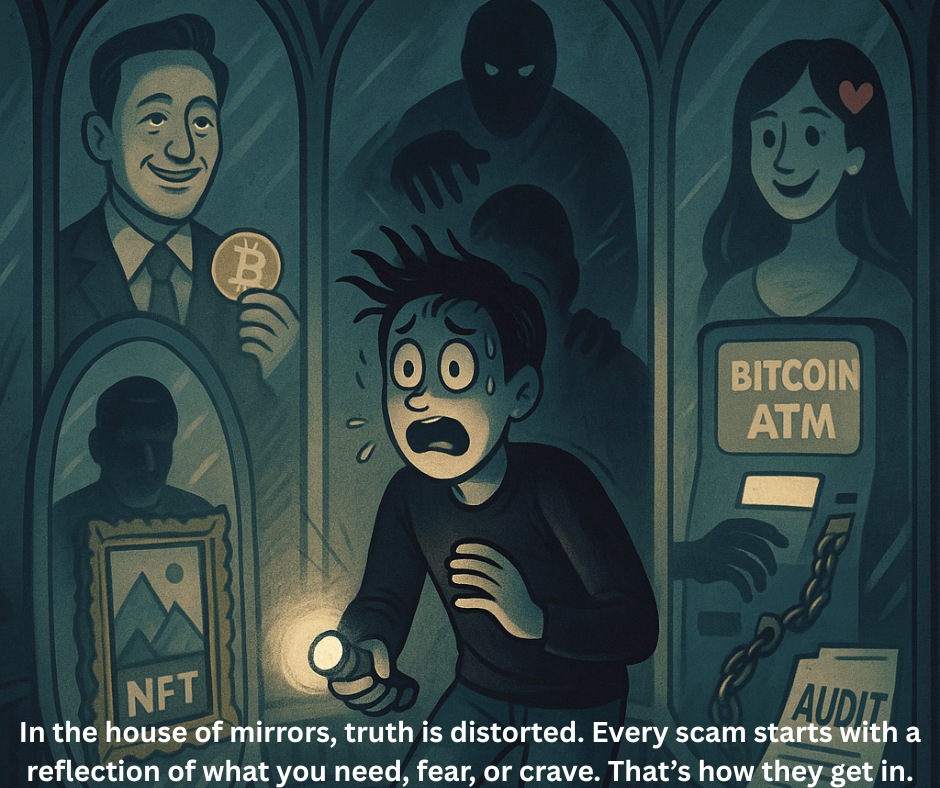
Crypto Scammers Know Your Story – And It’s the Tell
The truth is, there are many different F Words, but the one I want to shine a light on today is fraud, specifically, crypto fraud; the kind disguised by buzzwords and digital illusion. The thing is, crypto scammers know you. They study your fears, desires, and habits—then use that knowledge to build a trap designed to push you into emotional reaction and shut down rational thinking.
Fraud doesn’t take a day off, so neither should your awareness. If you think crypto scams only target the ultra-wealthy or those deep in the digital world, think again. Crypto scams are becoming everyone’s problem, and the schemes are getting bolder, sneakier, and harder to spot. From faked celebrity endorsements created with AI to art hoaxes that clean out entire savings accounts, crypto fraudsters are targeting anyone who isn’t ready to spot the red flags.
🧠 Modern Manipulation: A Psychological Game
With today’s crooks using deepfakes, fake authority calls, cryptocurrency ATMs, and precision-targeted psychological tactics to exploit your most vulnerable emotional states, the threat isn’t just theoretical. Everyday people, artists, investors, and retirees are all getting caught up as the deception tactics evolve. When the warning signs include urgency, secrecy, or requests for crypto payments from supposed officials, it’s time to hit pause and trust that gut feeling.
🎯It’s Not a Guess – You’re a Target
It’s easy to think, “I’d never fall for that,” until a con artist hits you exactly where you’re most emotionally exposed. They don’t guess, they study, listen, and zero in on the most vulnerable place in your life. If you’re feeling lonely, here comes the romantic partner of your dreams. When you’re out of work not knowing how to pay the bills, the perfect job opportunity finds you. Even when everything’s fine, but you’re secretly yearning for more wealth, they’ll offer the exclusive investment deal you didn’t know you were looking for. And sometimes, it’s not about what you want; it’s the fear of getting in trouble. A trickster impersonates law enforcement or the IRS, claiming you missed a fine, failed to pay an old ticket, or owe back taxes. That sudden jolt of panic? That’s precisely what they’re counting on.
If it happens, don’t blame yourself for not seeing it coming. Crypto scammers know you, which means they know exactly which buttons to push to cloud your judgment and make the scam feel urgent, emotional, and real.
😎 Celebrity Deepfakes and Impersonation Scams
Picture this: a video of a pop idol or tech billionaire “personally” pitching a new crypto. It’s polished, confident, and fake. AI-powered deepfakes and impersonation scams are no longer science fiction. They’re everywhere, blurring reality and making millions vanish.
Exploiters cook up fraudulent coins, put a celebrity’s image on them, and flood social media and group chats. Victims fall for the hype, and when FOMO takes over, wallets get drained in a “rug pull” that leaves no one but the scammers richer.
🚩 3 Red Flags to Remember:
- Unverified accounts “endorsing” crypto.
- Wild profit promises tied to a famous face.
- Urgent buy-in “before it’s too late” pressure.
🏧 Crypto ATM Trickery: The Modern Money Mule
Fraudsters are now calling victims pretending to be from law enforcement, the IRS, or banks, claiming accounts are compromised or involved in crimes. Victims are told to protect their funds by withdrawing cash and depositing it into Bitcoin ATMs. Once transferred, the funds are gone, irreversibly sent to scammer-controlled wallets.
🚩 Warning Signs:
- Unexpected “government” or bank calls.
- Requests for Bitcoin ATM deposits.
- High-pressure tactics to act immediately.
No government agency or bank will ever ask for crypto payments. Ever.
🎯 Targeted and Taken: Crypto Kidnappings
Fraud isn’t always digital; some of the most disturbing crypto crimes are happening offline. Criminals are now surveilling blockchain activity, social media posts, and public profiles to identify wealthy crypto holders. Once a target is identified, they’re abducted and forced, sometimes violently, to unlock wallets and transfer funds.
How it happens:
- People are targeted after flaunting wealth online or sharing large crypto transactions.
- Cybercriminals monitor transactions on public blockchains and cross-reference social media to locate individuals.
- Once kidnapped, victims are coerced, often at gunpoint, to transfer crypto or surrender access to their wallets.
How to protect yourself:
- Use cold wallets and multisig wallets to prevent access under duress. Cold wallets are offline crypto storage devices that can’t be accessed remotely; multisig wallets require multiple approvals to complete a transaction, adding an extra layer of protection if you’re ever coerced. Learn more about crypto custody options in this helpful Kraken guide.
- Avoid posting about holdings or large trades online.
- Be mindful of location data in social media posts.
- Watch who’s watching; bragging rights online aren’t worth your safety.
🚨 Emotional Warfare: Fear, Urgency and Control
Predators weaponize urgency and fear to override critical thinking. They use official-sounding messages and threats like “Your account will be seized unless you act NOW.” Their goal? Create panic and shut down your internal warning system.
🚩 What to Watch For:
- Demands to act now or face serious consequences.
- Authority-laced communications without verifiable info.
- That gut feeling of panic, always pause and reassess.
🎨 NFTs and the Art of the Scam
The art space is supposed to uplift creators, but scammers are exploiting it with a disturbing level of sophistication.
Fake NFT Buyers and Phishing Scams: They flatter artists, offer to buy pieces as NFTs, and then direct them to fake platforms or request “gas” fees. Once paid, they disappear.
Impersonation of NFT Platforms and Collectors: Scammers clone real platforms or pose as well-known collectors, asking for personal information or fake listing fees.
Unauthorized NFT Sales of Artists’ Work: Some fraudsters mint and sell NFTs of artists’ work, even posthumously, without consent, exploiting creative legacies for profit.
⚠️ Gut Check Moments:
- Being rushed to mint quickly
- Upfront fees or private wallet info requests
- Strange links from unknown senders
🚡 Spotting Red Flags Before It’s Too Late
Fraud lives in the gray areas, that split second where you doubt your gut. But trust me, your intuition knows.
Spotting Fake Endorsements: If a celebrity is shouting out a coin, verify their official account. Just because a celebrity’s face is on it doesn’t mean it’s real. Celebrities don’t promote crypto in your DMs. If it feels off, it probably is.
Understanding Government and Bank Impersonation: Legitimate agencies will never demand crypto or rush you into a decision. If you’re being rushed and told to stay silent, hang up and call the real number from your statement.
Learn to recognize that shiver of doubt, that irksome voice in the back of the mind, because that’s often the first sign something is off, and it might just save you from being the next crypto crime headline.
It’s about shedding light on how these schemes work so you can spot the pattern, not carry the pain.
🔒 Smart Moves to Stay Safe
🚩 Emotional Hooks Scammers Use:
- Pressure to act NOW? You’re likely facing a phishing attempt or a pump-and-dump scheme.
- Sudden urgency making you second-guess yourself? That’s a classic tactic from fake support agents or false authority figures.
- A promise that feels too good to be true? Chances are, it’s a celebrity scam or a fake prize designed to lure you in.
✅ Action Steps:
- Question everything: Don’t trust the pitch, verify the source.
- Guard your wallet: Never share private keys, passwords, or recovery phrases.
- Hang up, don’t pay up: No legitimate entity demands crypto by phone.
- Use MFA: Multi-factor authentication helps stop fraudsters in their tracks.
- Report & recover: File with the FBI Internet Crime Center (IC3) and FTC. Don’t suffer in silence.
🛡️ Where to Learn More and Report Fraud
According to the FBI and IC3, cryptocurrency investment fraud continues to rise rapidly. Here’s what they recommend:
- Be skeptical of unsolicited investment offers, primarily through social or dating apps.
- Verify identities and platform legitimacy before sending any funds.
- Never share your wallet recovery phrase or private keys.
- Don’t let urgency override logic; if it feels rushed, pause.
🧭 Learn more from these trusted sources:
Fraud doesn’t take a day off. But neither does your intuition. Listen to it, it just might save everything.
📩 Got a tip or a scam story others should hear about?
Email tips@thetruthaboutthefword.com and help spread awareness that protects others.

Leave a Reply
You must be logged in to post a comment.